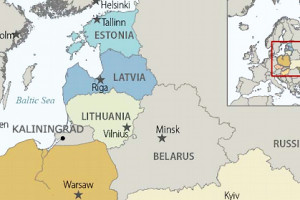Warning Of War, Ex-Deputy Commander Says NATO Must Counter ‘Russian Adventurism’ In Baltics

(RFE/RL – rferl.org – Eugen Tomiuc – May 22, 2016)
A former NATO deputy supreme commander is warning that the alliance could find itself in a full-fledged armed conflict with Russia within a year if it does not strongly step up its presence in the Baltic states.
Retired British General Richard Shirreff set out the stark scenario in a book published this week, 2017 War With Russia, which has raised eyebrows with its suggestion that what some are calling a “new Cold War” could turn hot in a hurry.
In an interview with RFE/RL, Shirreff stressed that the book — which describes Russian forces invading Latvia next May and piling into Ukraine in a bid to open a land corridor to illegally annexed Crimea — is a “work of fiction. ”
But he says he wants to send a “very strong signal” that NATO must act to ensure it stays that way.
“The point of the book is…to highlight the importance of strong, effective deterrence to prevent such an eventuality happening,” says Shirreff, who was deputy supreme allied commander Europe from 2011 to 2014. Before that he served in Northern Ireland, the Balkans, and Iraq, where he was a British tank commander in the First Gulf War.
The retired general says he is concerned that “Russian adventurism” could lead to an attack on Latvia, Lithuania, or Estonia, which were under Moscow’s thumb for decades after World War II and joined NATO in the years after the 1991 Soviet collapse.
A sharp deterioration of relations between NATO and Moscow since 2014, when Russia seized Crimea from Ukraine and backed separatists whose war against Ukraine’s government has killed more than 9,300 people, has raised alarm in the Baltics that they could be Moscow’s next targets.
“We continue to hear very bellicose signals coming out of Russia,” Shirreff says. “Russia, or President [Vladimir] Putin, has used force to change boundaries of Europe, he’s seen that force is successful.”
Shirreff’s publisher, Coronet, says he closely modeled his book on NATO “war gaming” scenarios — in this case, Russia opening a land corridor across Ukraine to Crimea and seizing the Baltic states to avoid what Kremlin officials have claimed is creeping “NATO encirclement.”
“I think NATO has to be strong to deter any sort of adventurism by Russia,” he says. “You know, I think we have to take account of the fact that Russia…invaded Georgia in 2008, it invaded Crimea in 2014, it invaded Ukraine in 2014.
Shirreff tells RFE/RL that a large, permanent conventional NATO presence in the Baltics is particularly important “given the huge strength of Russian troops around the Baltic states and the proximity of those Russian troops to major centers of population and capital cities.”
“Any strategy of deterrence which involves NATO deploying reserves or bringing troops from one country to another, which would take time, would simply not work, so the solution to that is to maintain troops permanently in the Baltic states,” he explains.
He says deterrence is particularly important since an attack on the Baltic states would mean a generalized war in Europe for the first time since 1945. “And not only that, but because Russia hardwires nuclear thinking into every aspect of their military doctrine it could also mean nuclear war,” Shirreff adds.
Shirreff has warned in the past against defense cuts by NATO countries that he says could leave them unable to fulfill alliance members’ obligation under Article 3 to be able to defend themselves.
‘Deter And Dialogue’
NATO’s eastern members, including the three Baltic states and Poland, have been pressing the alliance to increase its presence in the region. NATO is laying plans to do so, but is expected to avoid stationing large forces permanently — something that would be certain to add to Russia’s ire.
NATO foreign ministers have met in Brussels to finalize plans for the alliance’s biggest military build-up since the end of the Cold War. British Foreign Secretary Philip Hammond said it could include up to 3,500 troops and that it “isn’t intended to be aggressive.”
NATO leaders are expected to approve the overhaul — part of a “deter and dialogue” approach meant to guard against potential Russian aggression and reassure allies — at a summit in July in Warsaw. The details are still being discussed.
“We are still in development of the concept for enhanced forward presence [in NATO’s eastern member countries] in terms of the actual contribution of troops, the size of the force, etc.” U.S. General Curtis Scaparrotti, NATO’s supreme allied commander Europe, said on May 18.
Russia has criticized NATO’s plans, saying it believes talk of deterrence is a cover for encroaching on Russia’s borders. Western states counter that it is Russia that has acted aggressively, requiring a response.
Moscow also opposes the European missile shield that the United States has been building in concert with NATO, claiming that its aim is to undermine Russia’s security. Key elements of the shield were activated in Romania this month, as Poland broke ground for another component of the shield.
Shirreff says that while it is “absolutely right for NATO to continue to go down the line of ballistic-missile defense,” the alliance should focus on preventing a possible conflict with Russia through maintaining “an effective conventional deterrent as well.”
Some Western officials and military analysts say that warnings of a severe and imminent threat from Russia are overblown and in some cases amount to scaremongering aimed at boosting military budgets.
Shirreff says that while there is a need to spend more on defense in Europe and that all alliance members should meet their commitment to spend at least 2 percent of their GDP on defense, what matters most is using NATO’s assets “wisely, and deploying those assets to deter in the Baltic states.”
Article from Radio Free Europe/Radio Liberty – rferl.org – ©2016 RFE/RL, Inc. Article also appeared at rferl.org/content/russia-nato-former-commander-counter-adventurism-in-baltics/27750398.html
